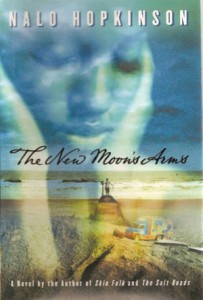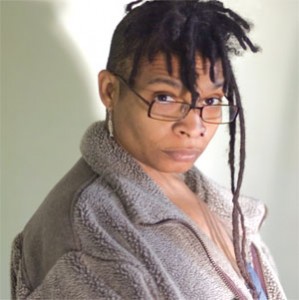Author Nalo Hopkinson Shares Her Extraordinary Mind
WHEN SPEAKING WITH award-winning writer Nalo Hopkinson, expectations are best left behind.
“I didn’t grow up with a sense of, ‘You cannot be what you want to be,’ and for that I have my parents to thank,” says the author from her home in Toronto.
Though many black writers have used fantastical elements in their work, Hopkinson is one of the few who identifies herself as a science-fiction writer. Writing in a genre traditionally dominated by a white, Eurocentric male perspective, she has received critical acclaim for novels that draw on the richness of Caribbean and African culture to push past the margins of everyday experience and take us into a world where imagination reigns.
“The thing about science fiction as a literature is that it doesn’t come out of our communities,” Hopkinson says. “If someone who doesn’t know anything about science fiction thinks about science fiction, they think about aliens and spaceships, and white people going to where the aliens live and colonizing them. We’ve been there. We’ve been on the other side of that. It’s not something that people feel they can insert themselves into. And yet, there are a lot of black readers of science fiction and fantasy, many of whom are longing to see themselves reflected in the literature they love.”
Hopkinson has done just that, creating characters of African descent who speak with the lilt of their native tongue and deal with real life issues. As a queer, black, female writer, Hopkinson sees the importance of portraying diversity as well as being open about her own identity.
“When I get frightened, one of the things I think is that other people helped me by being out, and I can do no less,” she says.
Hopkinson’s passion for writing is in her blood. Her father, Slade Hopkinson, was a professor of classical literature and a well-known poet, playwright and painter; her mother was a librarian. Growing up, the author devoured the well-read classics on her parents’ shelves, which ranged from Shakespeare to Homer’s Odyssey and Jonathan Swift’s Gulliver’s Travels. “I didn’t know it was supposed to be too hard for me,” she laughs.
 Born in Jamaica, Hopkinson lived in Trinidad, Guyana and the United States before she moved to Canada with her parents at 16. Almost a decade later, she decided to pick up the pen. The power of Hopkinson’s imagination first shook the international science-fiction and fantasy community with her award-winning novel, Brown Girl in the Ring. Set in a futuristic Toronto where spirits mingle with urban chaos, this hauntingly original debut was followed by three more novels, Midnight Robber, The Salt Roads and the recent The New Moon’s Arms. Hopkinson also published a collection of short stories, and has edited and co-edited a handful of anthologies, creating a body of work that has established her as a force of nature in the genre.
Born in Jamaica, Hopkinson lived in Trinidad, Guyana and the United States before she moved to Canada with her parents at 16. Almost a decade later, she decided to pick up the pen. The power of Hopkinson’s imagination first shook the international science-fiction and fantasy community with her award-winning novel, Brown Girl in the Ring. Set in a futuristic Toronto where spirits mingle with urban chaos, this hauntingly original debut was followed by three more novels, Midnight Robber, The Salt Roads and the recent The New Moon’s Arms. Hopkinson also published a collection of short stories, and has edited and co-edited a handful of anthologies, creating a body of work that has established her as a force of nature in the genre.
For Hopkinson, writing science fiction is a form of activism. “Fantasy talks about the stories that we tell ourselves to explain the world and the societies that we build,” she explains. “So it is really a literature where you get to look at different communities and how they function, and what their belief systems mean. All the fairies and dragons and stuff ultimately come out to some kind of belief system.”
You won’t find any dragons in Hopkinson’s work. Instead, you’ll discover a world where social analysis mingles with concepts of fractal math, ancestral rituals, time travel and evolution. One of the common elements of Hopkinson’s work is the seamless weaving of science and spirituality.
“Well, it was a dead surprise to me to find out that [science and spirituality are] supposed to be separated from each other. I was an adult before I was hitting that argument, and by then I’d already published my first novel that had both,” she says.
“The world is a miraculous place and some of the ways it works we can figure out, and some of them we haven’t figured out yet, and there’s stuff out there that’s so much bigger than us. I can see that, and I can see that I don’t have the first idea of how that came to be.”
A popular idea in the sci-fi community is that in the future, cross-racial interbreeding will make racism obsolete, but Hopkinson disagrees.
“We change our world. We create rituals, we create religions, we create technology, we create ways of dressing that help us identify with specific communities. We create music, literature, language, ways of speaking, and we’re not going to stop doing that in a hurry. Even if the ways we use now to separate into communities disappear, we’ll find others. Race is not really about the colour of your skin.”
The complex issue of race is one with which Hopkinson sees a web of intense complexity.
“The thing with the definitions and the boxes is that they absolutely have a use. Having a sense of identity of who you are, and what your communities are, is something that absolutely human beings need to do,” she argues.
“On the other hand, there’s this tension between having your own identities, and having people trying to lock you into them and essentialize what they think you are. I think, as human beings, we really need to learn how to keep two or more contradictory ideas in our head at once and have them both be true.”
Over the next year, Hopkinson will be busy working on her next two novels, both set in Toronto. The talented writer says that freedom and the expression to write beyond boundaries are crucial for other writers who would like to follow in her path.
“For some, social stricture weighs very hard. It really does constrict what they feel they can do. If, by being able to read my words in a book, they can see another way to be — at least in their heads if not reality — then I think I’m helping.”







Leave your response!